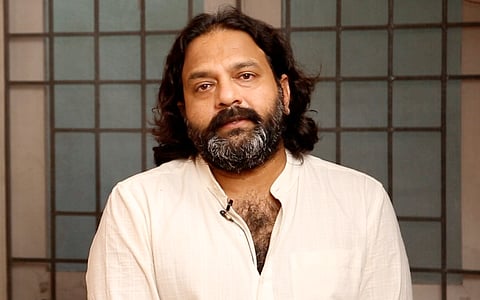
- Reviews
- Power List 2024
- Cannes 2024
- In-Depth Stories
- Web Stories
- News
- FC Lists
- Interviews
- Features
- FC SpecialsFC Specials

Excerpts from a conversation with Baradwaj Rangan
Siva, you are the executive producer of a lot of films that Madras Talkies makes. What does the job entail?
I see it more like the sweeper position in cricket. So, you can be deep cover, deep point, deep mid-off, basically you are there to cover a lot of things. Meaning, the term executive producer is used very freely in different companies and production houses. If you were to ask a different EP, he/she might give a completely different definition. I'm going to stick to what I do.
At Madras Talkies?
Or, as the EP of my company with Shaad. So, to start with, I think the EP role that I get to play here is very similar to the producer's role in Hollywood. Let's say, Spielberg makes a film for either Amblin or SKG, then Spielberg and Kathleen Kennedy would be the executive producers. Or Spielberg and Jeffrey Katzenberg would be the EPs. And then they'll hire producers for specific projects. So, if SKG were to produce, let's say, five films and five other shows, there might be 10 producers and he'll be the EP of all of them. So, in a way, the guy or the lady who brings in the money, who puts the whole project together becomes the EP.
And this also extends to people who take shares. Like, for example, let's say you make a film with a Stephen King novel and you're not going to pay him but you're to give him a percentage point, he may take an EP credit, which means he's not going to be involved in the day-to-day operations of the production and you have producers who handle the film. Now, in India, it's ulta. Mani Sir or Mr. Karan Johar, they become the producers, they're called the producers.
Because they finance the film?
Yes, they are the ones who bring in the money. They are the reason the film is getting made. So, in India we are used to calling them the 'producer' producer. And the executive producer, working under them, executes their ideas. So, I'm going to stick to the Indian definition. But in Hollywood, I would have been called a producer, anybody who's doing my job would be called a producer.
That's interesting, because I always thought that the producer brings in the money.
That's right, but that's right for the Indian scenario. In Hollywood, the producer works under an EP, he works for a studio.
So, let's take, just to make this a little easier, the Indian definition, but let's take a recent film that you worked on — Chekka Chivantha Vaanam. So, as an EP, what did your role entail?
To start with, I think the EP's primary job is to have control over the budget. To define the cost of production and keep contingencies ready. And the whole budget-making process in an organization like ours, because it is a smaller organization not a studio, also means that you have an understanding of the business. So, you're not going to budget a film for 100 Crores knowing it's only going to get sold for 50 Crores. So, step 1 is to actually define the scale of the project. To define the scale of the project, you get a hang of the script. So, the director, he gives you a story and says 'Hey, take a look at it and tell me how much it's going to cost and tell me how much we can actually make it for, so that we're not taking major risks'.
Okay, so let's step back for a second.
(Laughs)
Because you were also a writer on Chekka Chivantha Vaanam. So, take a project where you were only EP. Alaipayuthey?
No, no I was an AD in that. I think Kaatru Veliyidai.
Okay, so Mani Ratnam and team give you a script. And you take the script and then you say 'Okay, this has sequences in Kashmir, it has war plane sequences, it has some mountain… So, you understand that it needs fighter planes and all these other things… that's what you mean by getting a sense of the scale of the project?
Correct. And then you go to your boss and say 'Okay, it's going to cost X amount of money and he invariably laughs at you and says 'No, it's not going to cost that much'. 'I'm not looking at it like that so read it again. This is how I envision it'. So, we break it down further. And then we arrive at-
Without changing the script?
Of course! You never do that. I mean, the budget is made for the script not the other way around.